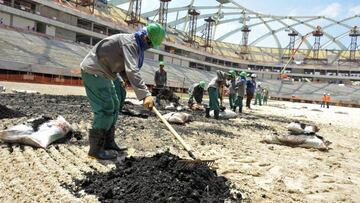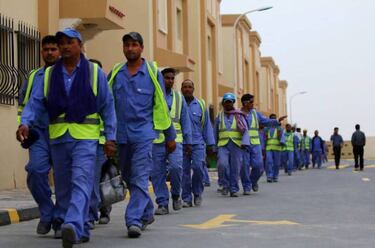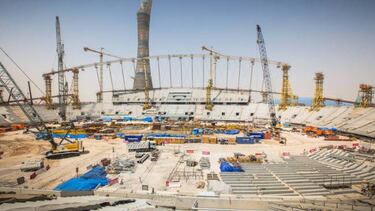"The Qatar authorities are making some very positive moves"
AS spoke to Rosey Hurst, founder and director of Impactt, which has published a 56-page report on working conditions for labourers ahead of the 2022 World Cup.

AS spoke to Rosey Hurst, founder and director of Impactt, an ethical corporate consultancy company who have been tasked with independent oversight of labour conditions for workers building Qatar's World Cup 2022 infrastructure.
What exactly does your company, Impactt, do?
We are retained by the Supreme Committee to monitor working conditions and then publish results. Now this is a very unusual thing, because normally bodies like the Supreme Committee wouldn’t want to be that transparent. So I think the first point is to say that we are delighted that they are so committed to transparency that they allow us to publish our report, warts and all. Because obviously it is really only by getting these issues into the open that we can solve them. So the first thing I would say is a big thumbs up for transparency.
I have read in the press release that you have seen increased progress in the worker’s situation in Qatar. Is this true?
Yes. This year, as against last year, for workers specifically working on the World Cup stadiums there is some progress, but it’s a long journey. This year, in general, we found compliance rates were higher than last year and we also found that the Supreme Committee were doing some very good work.
The two things they have done that I think are very good are, number one: beginning to pay back to workers the fees that they have paid to get jobs in Qatar, and what is really interesting about this is that the SC are really using their influence on the contractors to get money back into workers’ pockets. And often there is a lot of talk on this, but not much action, and it’s good to see the beginnings of action. They only started in December of last year doing this, so we will see more this year, but it’s a very interesting start, which very few other people are doing, so I think that’s very good. So we will see the impact of this next year, but we are seeing the beginning of action this year.
"The results are coming slowly, but they are coming"

There is a lot of pressure on Qatar from the public, especially from the UK, you are in London, so do you feel there has been a change in the mentality in Qatar with respect to the workers?
Yes, I think there is a change in the mentality. And the results are coming slowly, but they are coming. I think there is positive change, but it’s a long road and there are another three years to go of work, but we are seeing the signs of a change.
Have you analysed the effect of hope on the workers?
I think when migrant workers come from Asia they are full of hope, and the work can be hard and difficult. And what SC is trying to do is improve the worker experience in Qatar. Now luckily also the macro context has changed, so now we now have changes in the laws, driven by the ILO, the International Labour Organisation.
I’m reading here in the report that there are things that Qatar can do better. What sort of things do they need to improve?
They should continue to ensure that workers receive their recruitment fees back, they should continue to improve the position on working hours, where there are some issues, and they should also continue to build the capacity of the workers’ committees, so that the workers can have a voice. That’s the three things I would say. But these are all things that they are starting, so this year, 2018, will be the year when we test whether they have succeeded in doing these things at scale.
I understand that you have produced other reports on other the situation of other constructors, not in Qatar, in other countries.
We do work in all kinds of different industries, all around the world. Everything from high-tech factories to the garment sector, to coal mines, all over the world.
Do you make a comparison with Qatar…
Not directly, no. It’s not possible to make a direct comparison.
Why not?
Because we don’t have a similar sample in different countries. So it’s difficult to make comparisons, because the problems in different countries are different. So it’s hard to compare. But I would say that the authorities in Qatar are making some very positive moves. So if these moves deliver real changes, then that is an exciting possibility.
"The laws in Qatar have been recently changed to make a more favourable environment for workers"

Qatar is a country with a special political situation. What effect does this have on the workers. How does the Kefala system affect labour rights for employees?
This is across the Middle East. Many countries have similar laws across the Middle East. The laws in Qatar have been recently changed to make a more favourable environment for workers. So what we are looking at is how quickly these changes are being felt by workers. Because changing the law is one thing and changing everyday experience takes a little bit longer.
Related stories
Do you think that in 2022 when the World Cup starts, people will continue talking about the situation of the workers, or will the football take over?
It’s a good question. I think we should always think about the situation of the workers everywhere. So I’m very pleased that sports, and it’s not just the World Cup, it’s also the Olympics and the Commonwealth Games, and all big sporting events, are now starting to prioritise human rights. I think that’s a very good thing because it’s something that in the past has been forgotten. And it’s good that positive sporting events should focus on all the people involved, in the building, in the running of it, should have a positive experience. I would like to keep it on the agenda for ever.
